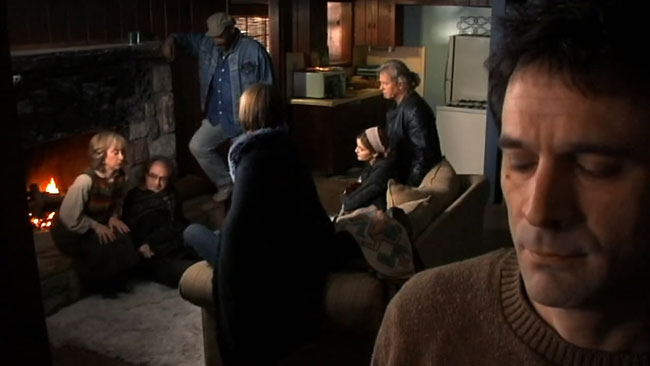5. The Man From Earth (2007)

The Man From Earth might be the film on this list with the lowest budget. You can criticize its production values, and even some of the acting all you want, but it has some of the strongest writing in an independent film. It says a lot that this film gained such a strong following through filesharing, it remains one of the most torrented films ever even a decade after its release. The cult following the film earned even led to a sequel that was released in 2017.
The Man From Earth takes a simple premise and lets its characters run wild: what if an intelligent, seemingly credible person told you they were over thousands of years old? Would you believe them? It’s a fascinating instance where the dialogue drives the premise of a film, and it’s never boring. The “one location setting” for an independent film has been done many times, but it’s the dedication to its theme of truth that has earned The Man From Earth its reputation.
4. The Matrix (1999)

Over the years The Matrix has become a source of parody, and possibly less effective than it once was. It may show its age, but when the Wachowskis’ The Matrix was first released it was a groundbreaking science fiction film that very quickly became a huge part of pop culture.
The now somewhat cliche concept of “taking a red pill vs. a blue pill” was originally a brilliant metaphor for truth in life. When Morpheus famously offers Neo the two choices, it symbolizes the difference between being enlightened, or taking the ignorance is bliss approach to life.
3. Persona (1966)

So much has been said about Persona over the years. The main reason why it’s so important, and why it’s being included here: it is a rich, thought-provoking film that has several interpretations. The film critic Peter Cowie once commented, “Everything one says about Persona may be contradicted; the opposite will also be true.” This is a very telling assessment of Bergman’s film: its genius lies in the fact that it is never easy to define.
Not only is Persona a challenging film, it also happens to be beautiful to look at. There are quiet moments in the film where the camera and performers do all the talking; a difficult feat to pull off well, especially in a film where truth is so important thematically.
2. Blind Chance (1987)

Krzysztof Kieślowski (a great filmmaker Kubrick publicly acknowledged being a fan of) made one of the most original, complex films with Blind Chance. It is basically a film about the various possibilities a single event can have. That sounds like something a character in a Linklater film might come up with; an idea that is interesting to discuss, but too strange to make an entire film around. But Kieślowski takes the idea and really builds a fascinating film around it: his committal to the wildly different ways one event can potentially result is uniquely done.
Blind Chance would serve as an influence for later films like Sliding Doors, and Run Lola Run. Although those films are certainly not without their own merits, they feel a lot more lighthearted.
Blind Chance was the first film to make the concept feel not like a gimmick, but a genuine exploration. It’s also worth noting that, like Kubrick, Martin Scorsese is another filmmaker that has acknowledged Kieślowski’s work: he has included the film in his “Masterpieces of Polish Cinema.”
1. Rashomon (1950)

Akira Kurosawa’s Rashomon is one of the most influential films of all time, and absolutely mandatory when mentioning the concept of “truth” in film. Kurosawa brilliantly explores a crime, and its various perspectives.
What really makes Rashomon work is the feeling that there is never a definitive answer for something so devastating. There are multiple flashbacks surrounding the same event, and they seemingly contradict each other.
It’s an extremely bold choice that has been imitated several times over the years in cinema history (in American film, The Usual Suspects might be the best example), but Rashomon was ahead of its time.
Author Bio: Dilair Singh is a film lover from Toronto. He particularly enjoys screenwriting, and hopes to sell a screenplay someday. You can find him on Twitter: @dilairsingh.